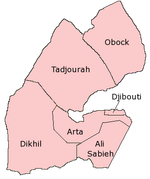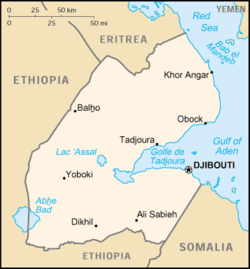Djibouti
For the capital of Djibouti, see Djibouti, Djibouti.
| |||||
| National motto: — | |||||

| |||||
| Official languages | Arabic, French | ||||
| Capital | Djibouti | ||||
| President | Ismail Omar Guelleh | ||||
| Prime Minister | Dileita Mohamed Dileita | ||||
| Area - Total - % water |
Ranked 146th 23,000 km² 0% | ||||
| Population | Ranked 161st
| ||||
| HDI (2003) | 0.495 (150th) – low | ||||
| Independence | June 27, 1977 | ||||
| Currency | Franc (DJF) | ||||
| Time zone | UTC+3 | ||||
| National anthem | Flag song | ||||
| Internet TLD | .dj | ||||
| Calling Code | 253 | ||||
The Republic of Djibouti (Template:Lang-ar, Ǧībūtī) is a country in eastern Africa, located in the Horn of Africa. Djibouti is bordered by Eritrea in the north, Ethiopia in the west and south, and Somalia in the southeast. The remainder of the border is formed by the Red Sea and the Gulf of Aden. On the other side of the Red Sea, on the Arabian Peninsula, 20 km from the coast of Djibouti, is Yemen.
History
Main article: History of Djibouti
The area of Djibouti has been occupied by several tribes, currently the Afar and the Somali Issa. These tribes had regular trade contacts with the Arabs, and adopted Islam as their religion.
In the 19th century, France established a protectorate in the area, named French Somaliland, governed by Léonce Lagarde. In 1967, the name was changed to the French Territory of the Afars and the Issas. On June 27, 1977, the country was granted independence as Djibouti.
A civil war led by Afar rebels in the early 1990s was stopped by a peace accord in 1994.
Politics
Main article: Politics of Djibouti
Ismail Omar Guelleh was on Saturday sworn in for a second and final six-year term as president of the tiny Horn of Africa nation, the official news agency, Agence Djiboutienne d'Information (ADI), reported. Guelleh won 100 percent of the votes cast in a one-man race on 8 April. According to ADI, 78.9 percent of approximately 197,000 registered voters cast their ballots - at 200 voting booths - across the country. Opposition parties boycotted, describing the poll as "ridiculous, rigged and rubbish". Present at the swearing in ceremony were several regional leaders.
Djibouti's second president, Guelleh was first elected to office in 1999, taking over from his uncle, Hassan Gouled Aptidon, who had ruled the country since its independence from France in 1977. [1]
The head of state of Djibouti is the president, who is elected for a term of six years. The president appoints a prime-minister, and heads the council of ministers.
The legislative body is formed by the Chambre des Deputes, which consists of 65 members which are elected every five years.
Subdivisions

Djibouti is divided into five regions and one city.
- Ali Sabieh Region (Region d'Ali Sabieh)
- Arta Region (Region d'Arta)
- Dikhil Region (Region de Dikhil)
- Djibouti (city) (Ville de Djibouti)
- Obock Region (Region d'Obock)
- Tadjourah Region (Region de Tadjourah)
Geography

Main article: Geography of Djibouti
Economy
Main article: Economy of Djibouti
The economy of Djibouti is based on service activities connected with the country's strategic location and status as a free trade zone in northeast Africa. Two-thirds of the inhabitants live in the capital city, the remainder being mostly nomadic herders. Scant rainfall limits crop production to fruits and vegetables, and most food must be imported.
Djibouti provides services as both a transit port for the region and an international transshipment and refueling center. It has few natural resources and little industry. The nation is, therefore, heavily dependent on foreign assistance to help support its balance of payments and to finance development projects. An unemployment rate of 40% to 50% continues to be a major problem. Inflation is not a concern, however, because of the fixed tie of the franc to the US dollar. Per capita consumption dropped an estimated 35% over the last seven years because of recession, civil war, and a high population growth rate (including immigrants and refugees). Also, renewed fighting between Ethiopia and Eritrea has disturbed normal external channels of commerce. Faced with a multitude of economic difficulties, the government has fallen into arrears on long-term external debt and has been struggling to meet the stipulations of foreign aid donors.

Demographics
Main article: Demographics of Djibouti
The population is divided into two main groups, the Issa, or Somali people, who make up about 60%, and the Afar, about 35%. The remainder is formed by Europeans (mostly French and Italians), Arabs and Ethiopians. The presence of two different population groups was the cause of the civil war in the early 1990s.
Almost all of the people of Djibouti are Muslim, only a small percentage are Christian, notably the Europeans.
Although French and Arabic are the official languages, Somali and Afar are widely spoken.
Culture
Main article: Culture of Djibouti
See also: Music of Djibouti, List of writers from Djibouti
Miscellaneous topics
- Communications in Djibouti
- Foreign relations of Djibouti
- Military of Djibouti
- Transportation in Djibouti
- List of fish on stamps of Afars and Issas
Further Reading
- Djibouti: Pawn of the Horn of Africa Robert Saint-Veran
- Historical Dictionary of Djibouti Daoud A. Alwan
- Naval Strategy East of Suez: The Role of Djibouti Charles W. Koburger
External links
Government
News
- allAfrica news headline links
- Daily press review in french and english
Overviews
Directories
- Djibouti guide Comprehensive information and resources about Djibouti
- Arab Gateway - Djibouti directory category
- LookSmart - Djibouti directory category
- Open Directory Project - Djibouti directory category
- Stanford University - Africa South of the Sahara: Djibouti directory category
- University of Pennsylvania - African Studies Center: Djibouti directory category
- Yahoo! - Djibouti directory category
Tourism
Notes
- ^ "DJIBOUTI: Guelleh sworn in for second presidential term". December 4.
{{cite web}}: Check date values in:|date=and|year=/|date=mismatch (help)


